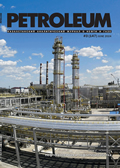Petrochemistry and oil refining
Tengiz – Flow Must Go On

Rustem Medetov is a top manager at one of Tengizchevroil's (TCO) contracting organizations and a recipient of the industry medal "For Contribution to the Development of Oil and Gas Services" from the Union of Oil Service Companies of Kazakhstan. He has overall industry experience of more than 20 years. He played a direct role in the construction project of the gas chemical complex in Atyrau as the Director of Contract Administration Department at KPI and as the Senior Manager at "Samruk-Kazyna Ondeu" LLP responsible for managing petrochemical assets, overseeing the infrastructure of the SEZ "National Industrial Petrochemical Technopark." He holds a Master of Business Administration and a Master of Science in Business Analytics from an American business school in Cambridge, Massachusetts.
Better safe than sorry
During parliamentary hearings in the Senate earlier this year, Deputy Sagyndyk Lukpanov mentioned that the government had identified 17 projects aimed at creating high-value clusters in priority areas. After examining these projects, senators concluded that they were selected without proper consideration of infrastructure, energy resources, raw materials, markets, logistics, and state support. According to the senator, government agencies have not fully analyzed all stages of implementing investment projects, nor have they considered all possible risks and mechanisms for mitigating them. Senate Speaker Maulen Ashimbayev stated that it is important to review and evaluate the effectiveness of all provided support measures for the processing industry to identify problems and bottlenecks. Among other issues, deputies voiced concerns about the country's first petrochemical complex construction project in Atyrau. Today, oil and gas industry expert Rustem Medetov shared with Petroleum his opinion on the aspects of the project that could be reconsidered.
I did it my long way
The supply of raw materials for the petrochemical complex is expected to be through the preliminary processing of dry gas from TCO at the KMG PetroChem gas separation unit. The ethane obtained in this way, along with propane, which is currently transported in rail tank cars, will then be piped over a distance of 225 kilometers to the petrochemical complex in Karabatan. This significant distance far exceeds global standards for the supply of raw materials to petrochemical plants, which usually prefer closer proximity to reduce costs and risks.
Constructing a pipeline over 200 kilometers long will require significant capital investments. Costs include land allocation (half of the entire area of the NIPT SEZ), pipeline materials, labor, and associated infrastructure. For example, compressor stations will be needed along the pipeline to maintain the pressure and flow of gases, increasing both initial capital and ongoing operational expenses.
When less is more
Most petrochemical complexes are located much closer to their raw material sources. For example, on the US Gulf Coast, feedstock pipelines typically range from 50 to 100 kilometers. This proximity helps reduce transportation costs and operational risks. And the integration of the Sadara Chemical Complex in Saudi Arabia with its adjacent oil refinery is an example of minimal distance, improving operational efficiency and maintaining high feedstock quality.
Globally, the average distance for pipelines supplying raw materials to petrochemical plants is approximately 50-100 kilometers. Similar examples include the industrial city of Jubail in Saudi Arabia, where petrochemical enterprises are within 50 kilometers of their raw material sources. In Europe, petrochemical plants are often located within 50 kilometers of their raw material bases, as seen in the Rotterdam petrochemical cluster.
Out of sight, not all right
Building a pipeline over 200 kilometers long will require significant capital investments and result in high operational costs. The long distance increases the risk of raw material quality degradation and potential supply disruptions, which could affect the operational efficiency of both the petrochemical complex and the uninterrupted production at TCO in Tengiz.



